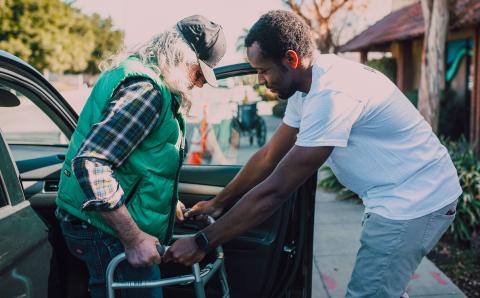Why are there so many “fake” Christians? Unfortunately, I don’t have an answer that covers every situation, but I can tell what I’ve learned while reflecting on this question in the context of my own life for the past decade.
I’m now in the second half of life. I look back on the previous years and decades and marvel at how “fake” I have been as a Christian. It is dishearteningly easy to drift from a focused, dynamic, and trusting posture toward the God revealed in Jesus Christ that opens me up to the entire creation. Instead, I see how much of my life, work, relationships, and even ministry flowed out of shabby substitutes: fear, peer pressure, insecurity, and even anger and envy.
I have worked too much at building and maintaining a facade. I have become adept at going through the motions to earn acceptance. I have put too little effort into being honest with myself about my complex and nuanced feelings. I have not yet learned how to accept the gift of grace (in whatever shape it takes) with authentic gratitude.
I’ve learned that my personal history and our competitive culture make vulnerability seem worse to me than death. I notice more clearly how our dualistic culture has infected me, producing parallel versions of myself: a public self that is pious and compliant and a private self that is power- and influence-hungry. I am still too tied to national or ethnic identities. I am still so immature that I can label others as “fake” Christians simply for thinking or voting differently than I do.
As Jesus draws me ever closer to his transforming presence, I’m becoming aware of the reality that every Christian is “fake.” It takes bravery to honestly recognize that I am not perfect. I am a fallen, broken, disordered, and rebellious creature in my own spectacular way (this is the theological meaning of “sin”). In fact, the only person who has ever lived who wasn’t a “fake” Christian is someone who wasn’t even a Christian himself: Jesus of Nazareth. He was the only fully authentic, truly human person—what the New Testament means by calling Jesus the second Adam.
I used to think that being a Christian magically made me a perfect person. I understood forgiveness as the reason I didn’t think I had to put much intentional effort into maturing out of my follies and foibles, my vices and vacillations. But Christians aren’t perfect people. They’re people in the process of being made whole again (the deeper Hebrew meaning of the Greek concept of perfection). It’s when I refuse or fail to recognize and admit my fallenness that I become “fake.”
This is why so many students I interact with are uninterested in religious labels that have become almost meaningless. The concern is not what box I check on a survey of religious affiliation, but whether my life conforms to the life-giving pattern set by Jesus or not.
When I look in the mirror, I’m learning to recognize two truths. On the one hand, I see a powerfully loved child of God. But I also see the many ways in which I run from that identity. It is only in and through Jesus’ radical embrace that I am being transformed by God’s unrelenting love. So rather than spending time looking around and judging other Christians to determine for my own self-satisfaction whether they’re “fake” or not, my energies are better spent reflecting on the specific ways in which I myself continue to think and believe and behave as if my “fake” self is my true self.
About the Author
Michael Wagenman is the Christian Reformed campus minister at Western University in London, Ont., where he invites undergraduate students to put their faith into loving service and mentors graduate students. His most recent book is The Power of the Church: The Sacramental Ecclesiology of Abraham Kuyper (Wipf &Stock, 2020).









